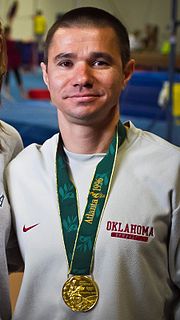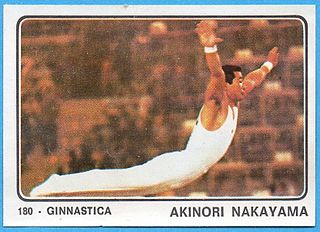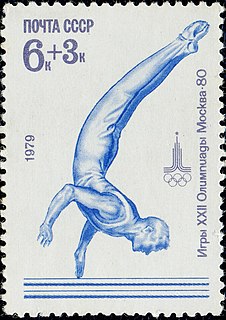
The men's vault competition was one of eight events for male competitors in artistic gymnastics at the 1996 Summer Olympics in Atlanta. The qualification and final rounds took place on July 20, 22 and 29th at the Georgia Dome. There were 105 competitors from 31 nations, with nations in the team event having up to 7 gymnasts and other nations having up to 3 gymnasts. The event was won by Alexei Nemov of Russia, the nation's first victory in the men's vault after the dissolution of the Soviet Union. Yeo Hong-Chul gave South Korea its third consecutive podium appearance in the event, this time with silver. Vitaly Scherbo of Belarus was the fifth man to win multiple medals in the vault, adding bronze to his 1992 gold.

The men's rings competition was one of eight events for male competitors in artistic gymnastics at the 1996 Summer Olympics in Atlanta. The qualification and final rounds took place on July 20, 22 and 28th at the Georgia Dome. There were 102 competitors from 31 nations, with nations in the team event having up to 7 gymnasts and other nations having up to 3 gymnasts. The event was won by Jury Chechi of Italy, the nation's first victory in the men's rings since 1924 and first medal in the event since 1964. There was a tie for silver, between Szilveszter Csollány of Hungary and Dan Burincă of Romania. It was the best result so far for either nation; Romania had previously had a bronze medalist but this was Hungary's first trip to the podium in the rings.

The men's parallel bars competition was one of eight events for male competitors in artistic gymnastics at the 1996 Summer Olympics in Atlanta. The qualification and final rounds took place on July 20, 22 and 29th at the Georgia Dome. There were 106 competitors from 31 nations, with nations in the team event having up to 7 gymnasts and other nations having up to 3 gymnasts. The event was won by Rustam Sharipov of Ukraine, the nation's first victory in the men's parallel bars after the dissolution of the Soviet Union. Jair Lynch earned the United States' first medal in the event since 1984 with his silver. Defending champion Vitaly Scherbo earned bronze for Belarus. He was the sixth man to win multiple medals in the parallel bars.

The men's vault competition was one of eight events for male competitors in artistic gymnastics at the 1992 Summer Olympics in Barcelona. The qualification and final rounds took place on July 29 and August 2 at the Palau dels Esports de Barcelona. There were 93 competitors from 25 nations, with nations in the team event having 6 gymnasts while other nations could have up to 3 gymnasts. The event was won by Belarusian Vitaly Scherbo of the Unified Team, the first victory by a Soviet or former Soviet in the event since 1980. The silver went to Hrihoriy Misyutin, a Ukrainian also competing for the Unified Team. Yoo Ok-ryul gave South Korea its second consecutive bronze medal in the men's vault.

The men's pommel horse competition was one of eight events for male competitors in artistic gymnastics at the 1992 Summer Olympics in Barcelona. The qualification and final rounds took place on July 27, 29 and August 2 at the Palau d'Esports de Barcelona. There were 93 competitors from 25 nations, with nations in the team event having 6 gymnasts while other nations could have up to 3 gymnasts. For the third consecutive Games, the pommel horse ended in a tie for the gold medal. Belarusian Vitaly Scherbo and North Korean Pae Gil-su shared the top place. It was North Korea's first medal in the event. Bronze went to Andreas Wecker of Germany.

The men's rings competition was one of eight events for male competitors in artistic gymnastics at the 1992 Summer Olympics in Barcelona. The qualification and final rounds took place on July 27, 29 and August 2 at the Palau dels Esports de Barcelona. There were 93 competitors from 25 nations, with nations in the team event having 6 gymnasts while other nations could have up to 3 gymnasts. The event was won by Vitaly Scherbo of the Unified Team, the fourth time in five Games that a Soviet or former Soviet gymnast won the rings. Li Jing of China earned silver. There was a tie for third, with Andreas Wecker of Germany and Li Xiaoshuang of China each receiving bronze medals. It was the first medal for unified Germany since 1936, though East Germany had won gold and bronze in 1988.

The men's parallel bars competition was one of eight events for male competitors in artistic gymnastics at the 1992 Summer Olympics in Barcelona. The qualification and final rounds took place July 27, 29 and August 2 at the Palau dels Esports de Barcelona. There were 93 competitors from 25 nations, with nations in the team event having 6 gymnasts while other nations could have up to 3 gymnasts. The event was won by Vitaly Scherbo of the Unified Team, the third time in four Games that a Soviet or former Soviet gymnast won the rings. Li Jing of China earned silver. There was a three-way tie for third, with Igor Korobchinski of the Unified Team, Guo Linyao of China, and Masayuki Matsunaga of Japan each receiving bronze medals. They were the first medals for China in the parallel bars.

The men's horizontal bar competition was one of eight events for male competitors in artistic gymnastics at the 1992 Summer Olympics in Barcelona. The qualification and final rounds took place on July 27, 29 and August 2 at the Palau dels Esports de Barcelona. There were 93 competitors from 25 nations, with nations in the team event having 6 gymnasts while other nations could have up to 3 gymnasts. The event was won by Trent Dimas of the United States, the nation's first victory in the event since 1932 and fourth gold medal in the horizontal bar overall. Andreas Wecker of Germany earned silver in the nation's return after unification; the first medal for "Germany" in the event since 1952. The Unified Team's Grigory Misutin took bronze.

The men's pommel horse competition was one of eight events for male competitors in artistic gymnastics at the 1988 Summer Olympics in Seoul. The qualification and final rounds took place on September 18, 20 and 24th at the Olympic Gymnastics Hall. There were 89 competitors from 23 nations, with nations competing in the team event having 6 gymnasts and other nations having up to 3 gymnasts. For the second time, the event ended in a three-way tie for first place. Dmitry Bilozerchev of the Soviet Union, Zsolt Borkai of Hungary, and Lubomir Geraskov of Bulgaria each received a gold medal. It was Bulgaria's first medal in the pommel horse. Hungary had its third gold medal in four Games, with Zoltán Magyar winning in 1976 and 1980 before the nation joined the Soviet-led boycott in 1984. The Soviets had had an eight-Games medal streak in the event snapped by that boycott; Bilozerchev's medal put the nation back on the podium after that one-Games absence.

The men's parallel bars competition was one of eight events for male competitors in artistic gymnastics at the 1988 Summer Olympics in Seoul. The qualification and final rounds took place on September 18, 20 and 24th at the Olympic Gymnastics Hall. There were 89 competitors from 23 nations, with nations competing in the team event having 6 gymnasts and other nations having up to 3 gymnasts. The event was won by Vladimir Artemov of the Soviet Union, bracketing the 1984 boycott with gold medal wins for the Soviets; Valeri Liukin took silver, as well. Sven Tippelt of East Germany took bronze.

The men's horizontal bar competition was one of eight events for male competitors in artistic gymnastics at the 1988 Summer Olympics in Seoul. The qualification and final rounds took place on September 18, 20 and 24th at the Olympic Gymnastics Hall. There were 89 competitors from 23 nations, with nations competing in the team event having 6 gymnasts and other nations having up to 3 gymnasts. There were ties for both gold and bronze medals. The Soviet Union took two golds, as Vladimir Artemov and Valeri Liukin finished even at the top spot; they were the Soviets' first gold medals in the horizontal bar since 1968, and moved the Soviet Union past the United States and Switzerland into second most all-time golds in the event. Bronze medals went to Holger Behrendt of East Germany and Marius Gherman of Romania, the first medal in the event for both nations. It was the first time since 1964 that Japanese gymnasts competed but did not win the event.

The men's rings competition was one of eight events for male competitors in artistic gymnastics at the 1972 Summer Olympics in Munich. The qualification and final rounds took place on August 27, 29 and September 1 at the Olympiahalle. There were 111 competitors from 26 nations ; nations entering the team event had 6 gymnasts while other nations could have up to 3 gymnasts. The top two places were the same as in 1968, while the next two places were taken by the same gymnasts but in the opposite order. The event was won by Akinori Nakayama of Japan, the nation's third consecutive victory in the men's rings; Nakayama was the second man to successfully defend an Olympic title in the event. Mikhail Voronin's second consecutive silver extended the Soviet Union's podium streak in the rings to six Games. Nakayama and Voronin were the fifth and sixth men to earn multiple medals in the rings. Mitsuo Tsukahara of Japan took bronze, switching places with fourth-place finisher Sawao Kato from the previous Games.

The men's vault competition was one of eight events for male competitors in artistic gymnastics at the 1980 Summer Olympics in Moscow. The qualification and final rounds took place on July 20, 22 and 25th at the Luzhniki Palace of Sports. There were 65 competitors from 14 nations, with nations competing in the team event having 6 gymnasts while other nations could have to up to 3 gymnasts. The event was won by Nikolai Andrianov of the Soviet Union, the first man to successfully defend an Olympic title in the vault. Andrianov was also the first man to win a third medal in the event, with a bronze in 1972 along with his 1976 and 1980 gold medals. For the eighth consecutive Games, the Soviets had a gymnast in the top two in vault; this time, they had both the top two, as Alexander Dityatin took silver. Roland Brückner of East Germany earned bronze.

The men's rings competition was one of eight events for male competitors in artistic gymnastics at the 1980 Summer Olympics in Moscow. The qualification and final rounds took place on July 20, 22 and 25th at the Luzhniki Palace of Sports. There were 65 competitors from 14 nations, with nations competing in the team event having 6 gymnasts while other nations could have to up to 3 gymnasts. The event was won by Alexander Dityatin of the Soviet Union, the nation's fifth victory in the rings, with fellow Soviet Aleksandr Tkachyov taking silver. It was the second consecutive Games that the Soviet Union had the top two men in the rings. Dityatin, the silver medalist in Montreal 1976, was the seventh man to win multiple medals in the rings. Jiří Tabák earned Czechoslovakia's first medal in the event since 1948.

The men's parallel bars competition was one of eight events for male competitors in artistic gymnastics at the 1980 Summer Olympics in Moscow. The qualification and final rounds took place on July 20, 22 and 25th at the Luzhniki Palace of Sports. There were 65 competitors from 14 nations, with nations competing in the team event having 6 gymnasts while other nations could have to up to 3 gymnasts. The event was won by Aleksandr Tkachyov of the Soviet Union, the nation's first victory in the parallel bars since 1960 and third overall, tying Switzerland for second-most all-time behind Japan's four. Fellow Soviet Alexander Dityatin took silver, while Roland Brückner earned East Germany's first medal in the event. Japan's four-Games gold medal streak in the event ended with no Japanese gymnasts competing due to the American-led boycott.

The men's horizontal bar competition was one of eight events for male competitors in artistic gymnastics at the 1980 Summer Olympics in Moscow. The qualification and final rounds took place on July 20, 22 and 25th at the Luzhniki Palace of Sports. There were 65 competitors from 14 nations, with nations competing in the team event having 6 gymnasts while other nations could have to up to 3 gymnasts. The event was won by Stoyan Deltchev of Bulgaria, the nation's first medal in the horizontal bar. The Soviet Union took silver and bronze, reaching the podium in 1968 for the first time since 1968. Japan's three-Games gold medal streak ended, with no Japanese gymnasts competing due to the American-led boycott.

The men's pommel horse competition was one of eight events for male competitors in artistic gymnastics at the 1984 Summer Olympics in Los Angeles. The qualification and final rounds took place on July 29, 31 and August 4 at UCLA’s Pauley Pavilion. There were 71 competitors from 19 nations, with nations competing in the team event having 6 gymnasts while other nations could have to up to 3 gymnasts. The event was won in a tie between Li Ning of China, in the nation's debut in the Games, and Peter Vidmar, with the United States' first gold medal in the pommel horse since 1904 and first medal in the event since 1932. The bronze medal went to another American, Tim Daggett. The Soviet Union's eight-Games podium streak in the event ended with no Soviets competing due to the boycott.

The men's rings competition was one of eight events for male competitors in artistic gymnastics at the 1984 Summer Olympics in Los Angeles. The qualification and final rounds took place on July 29, 31 and August 4 at UCLA’s Pauley Pavilion. There were 71 competitors from 19 nations, with nations competing in the team event having 6 gymnasts while other nations could have to up to 3 gymnasts. The event was won in a tie between Li Ning of China, in the nation's debut in the Games, and Koji Gushiken, with Japan's first gold medal in the rings since 1972. The bronze medal went to American Mitchell Gaylord, the nation's first medal in the event since 1932. The Soviet Union's eight-Games podium streak in the event ended with no Soviets competing due to the boycott.

The men's parallel bars competition was one of eight events for male competitors in artistic gymnastics at the 1984 Summer Olympics in Los Angeles. The qualification and final rounds took place on July 29, 31 and August 4 at UCLA’s Pauley Pavilion. There were 71 competitors from 19 nations, with nations competing in the team event having 6 gymnasts while other nations could have to up to 3 gymnasts. The event was won by Bart Conner of the United States, the nation's first victory in the parallel bars since 1904 and second overall. Another American, Mitch Gaylord, took bronze. Japan returned to the podium after the 1980 boycott broke its six-Games medal streak, with Nobuyuki Kajitani's silver.

The men's horizontal bar competition was one of eight events for male competitors in artistic gymnastics at the 1984 Summer Olympics in Los Angeles. The qualification and final rounds took place on July 29, 31 and August 4 at UCLA’s Pauley Pavilion. There were 71 competitors from 19 nations, with nations competing in the team event having 6 gymnasts while other nations could have to up to 3 gymnasts. The event was won by Shinji Morisue of Japan, continuing the nation's dominant streak where it left off before the 1980 boycott. Morisue scored a perfect 20 in the event ; he was one of only three gymnasts to achieve a perfect 20 on an apparatus during the 20-point era (1952–1988). The gold medal was Japan's sixth on the horizontal bar, all within eight Games. Koji Gushiken added a bronze medal for Japan. The People's Republic of China debuted strongly, with a silver medal from Tong Fei.















